Welcome to the eleventh installment of More Than Words, where I take queer words of all sorts and smash them apart and see what makes them tick. Every week I’ll be dissecting a different word, trying to figure out where it came from, how it has evolved, where it might be going, and what it all means. It’s like reading the dictionary through a prism. Feel free to send word suggestions to [email protected].
Header by Rory Midhani
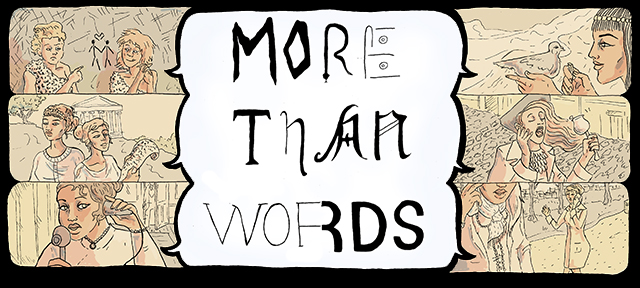
Dyke is going through a familiar reclamation process, motoring alongside queer — it was just a word, and then it was a slur, and then it was a term of proud and specific identification (we’ll explore this more in Pt. 2). But what about before all that?
Most lesbians I know have their own theory about where dykes come from (my money’s on Northampton). And it turns out most linguists have their own theories about where dyke comes from, too. The first time anyone defined “dike” as a lesbian in print it was to correct someone else who had messed it up, and the OED has stuck with “of obscure origin” for a while now, so it’s pretty much open season. I was a little disappointed to find that dyke in the ‘gay-woman’ sense has nothing to do with dyke in the ‘stick-your-finger-in-it-all-night-to-save-a-country’ sense. Luckily, the alternatives are nearly as interesting. Here are some of my favorites.
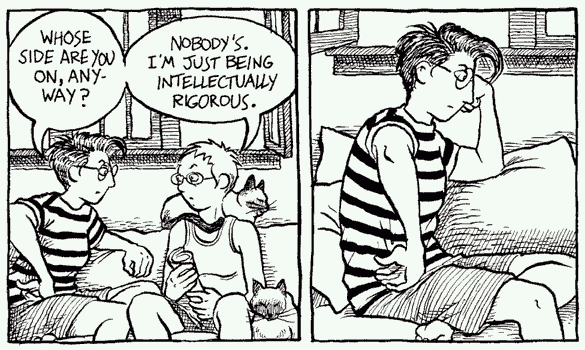
YEAH RIGHT, LINGUISTS (VIA DYKES TO WATCH OUT FOR)
Boudica-licious
Back in the days when Rome ran most of Europe, and when Brittania was a collection of tribes and not a misspelled Glee ‘ship, one of those tribes was called the Iceni. In AD 61, the Iceni were ruled by a man named Prasutagus, who had a healthy alliance going with the ever-conquering Romans — up until he died and tried to perpetuate his bloodline by leaving his kingdom jointly to the Roman emperor and his own two daughters, instead of just turning it all over to Rome as was traditional. In response, the Romans seized the Prasutagian estate, flogged his surviving relatives, and called in their many colonialist loans all at the same time, effectively bankrupting the kingdom. And who stands idly by and lets that happen to her kingdom? Certainly not the Icenian Queen Boudica. As the Roman historian Tacitus explained, “she was a woman of kingly descent (and the Britons do not distinguish sex in matters of sovereignty).” She was also “tall, terrible to look on and gifted with a powerful voice [and] a flood of bright red hair,” and had spent her teenage years in warrior school.
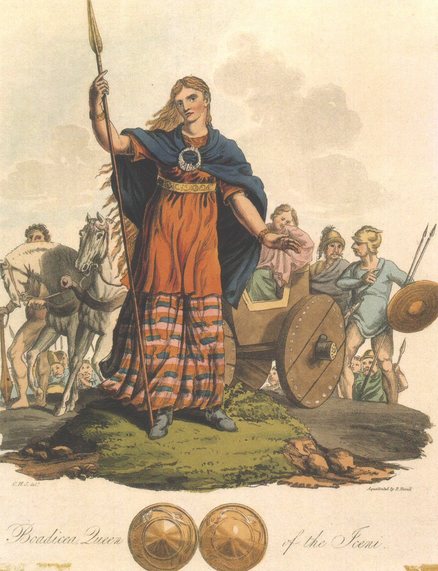
(SHE WAS REALLY GOOD AT WARRIOR SCHOOL)
Boudica led her subjects and those of several neighboring tribes in a revolt that cut a bloody swath through state capitals, military settlements, and religious sites. Her army was 100,000 strong, and after killing nearly as many Roman troops, they were defeated by Emperor Seutonius at the Battle of Watling Street. This marked the end of Britain resistance to Roman rule, and Boudica either died of an illness or committed suicide to avoid capture. She then disappeared in the folds of history until the Victorian era, when that queen, in an effective PR coup, named Boudica as her namesake and inspiration. Poet Laureate Alfred, Lord Tennyson wrote her a poem that could pass for a B-side by Alanis Morissette (“in me burns an anger, not by blood to be satiated!… so the Queen Boadicea, standing loftily charioted,/brandishing in her hand a dart and rolling glances lioness-like/yell’d and shriek’d between her daughters”). Someone fashioned a giant bronze statue. And according to etymologist Douglas Wilson, people might have started using her name to refer to any woman who seemed like she could potentially lead an army of thousands. Since the evolution of language is like an enormous game of Telephone, the term inevitably changed — go ahead, say “Boudica” ten times fast, and by the end what has it turned into? Sounds a little like “bulldyker,” doesn’t it?
FUN FACT: Another common (but almost definitely false) rumor about Boudica is that she is buried between Platforms 9 and 10 at King’s Cross Station in London, so not only is she an honorary lesbian, she is an honorary Hogwarts student.
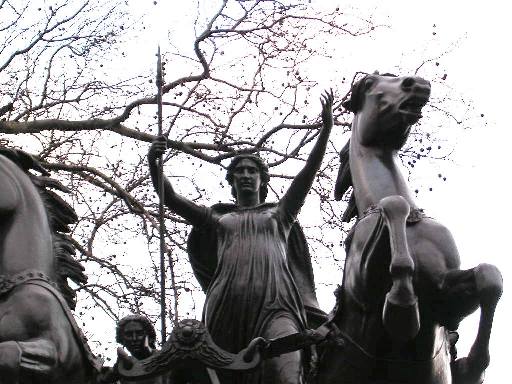
COME AT ME
Suit & Tie
Long after Boudica, and after the British found themselves on the other side of empire-building gone awry, some brave linguists dedicated themselves to chronicling how the crazy rebellious colonists had bastardized their mother tongue. A possible precursor to dyke can be found in several of these compilations of Americanisms. Maximilian Schele de Vere’s “Americanisms: the English of the New World” (1871) and Sylvia Clapin’s “A New Dictionary Of Americanisms; being a glossary of words supposed to be peculiar to the United States and the Dominion of Canada” (1902) have extensive entries for the “peculiar American cant term” dike, defined as “the full dress, or fine clothes, of a man” or “to attire oneself faultlessly for social purposes.” Right underneath is dicked out, or out on a dike, both of which basically mean “fresh to death.” Both authors speculate that these words are overseas cousins of dight, an Old English confection meaning “to get fancy.” In her extensive 1979 study “In America They Call Us Dykes,” etymologist J.R. Roberts puts the pieces together:
“There is growing evidence that during the nineteenth and early twentieth centuries a number of women in both the United States and Europe were adopting male attire, both permanently and on occasion… [some of] these women dressed, lived, voted, worked as men in the mainstream culture. [Others] were also dressing in much the same manner, not especially for the purpose of “passing” as men, but for the real and implied emotional, political, and social freedoms inherent in the male costume. …It seems possible that in the American culture where the term dike denoted “the full set of male clothing” or “a man in full dress,” this term could also have been applied to women who dressed in such clothing. Possibly these early radical women, dressing and passing in male clothing, both permanently and on occasion, were in fact our first dike sisters in America.”
MURRAY HALL, A LATE 19TH CENTURY “PASSING WOMAN”
Greeking Out
A couple of less popular theories want to gives credit for “dyke” to the ancient Greeks, whose pantheon of gods and goddesses are tempting targets because they let linguists put a face on old words. The first of these theories, proposed by poet Elsa Gidlow (an O.G. of lesbian poetry, memoir, and bohemian commune-founding), traces dyke back to Dike, a Greek goddess “approached [Zeus’s] throne with lamentations whenever a judge violated justice.” She was a “handsome goddess” who enjoyed beating her opposite (Adikia, the personification of injustice) with a staff, piercing the hearts of the unjust, and rewarding the fair and balanced.
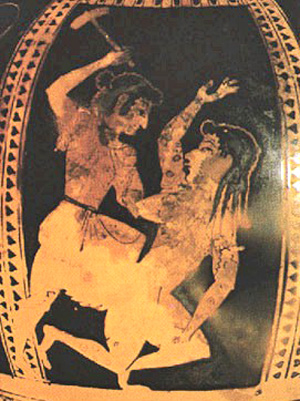
DIKE VS. ADIKIA
Meanwhile, structural linguist Archibald A. Hill, though he’s pretty sure he’d “seen it suggested somewhere,” was the first person I found to hazard, on paper, that “dyke” is a shortened form of “morphodyke.” That word is in turn a “colloquial shortening and mispronunciation of ‘hermaphrodite,’ which itself harkens back to Greek mythology via Hermaphroditus, the son of Hermes and Aphrodite, who merged with a water nymph and so became “a single body with a double sex.” (It would also make a great X-Men name for someone more qualified to reclaim it. Just saying.)
Odds & Ends
As happens with many little words with loaded meanings, linguists simply can’t stop trying to figure this one out. An 11-page paper by Richard A. Spears goes through dozens of possibilities before concluding that “the only explanation for dike which can be considered valid is the one which appears at the OED Supplement entry for dike: “[Of obscure origin].” Ten years later, Susan E. Krantz tried the same thing in the same journal and she also couldn’t make it out of the brackets. But it’s still fun to watch them trawl old dictionaries and compendiums and spitball a little. Among their wildest guesses:
- “Dagging” is a popular Australian term for cleaning a sheep’s wool before shearing. Maybe a bulldagger is “a strong, husky person able to clean up a bull” in this way, and so one-up all the sheepdaggers.
- The prefix “bull” might not mean a male cow! It’s also used “to imply jest or falsehood” (from the Old French boul, or deceit, in a nice convergence with the New American bullsh*t). So a bull-head in 17th century England was a wig, and maybe a bulldike was a fake penis, “a derogatory but logical synecdochic expression for a… lesbian.”
- “One interesting possibility is from Dutch (via Afrikaans) duiker (literally ‘diver’), a small African antelope which jumps and dives about. Terms such as diver, muff-diver and pearl-diving referring to oral sex are known in American English.”
- Or maybe we’re overthinking this, and “diker” literally means “dike-builder,” and a bulldiker is simply a woman strong enough to do that really well.

MY NEW MASCOT, THE BULL DUIKER
And once again, we have traveled very far in time and space and concluded very little except for that etymologists of all times and spaces are kind of crazy, and that dyke has always contained multitudes. But what happened after 1930, when discourse around the word swapped linguistic mystery for political and social complexity? When did dykes start biking? How did Alison Bechdel help sue the US Trademark Trial and Appeal Board? Are there any more small African mammals involved? Tune in next time and see how dyke continues to morph(o).
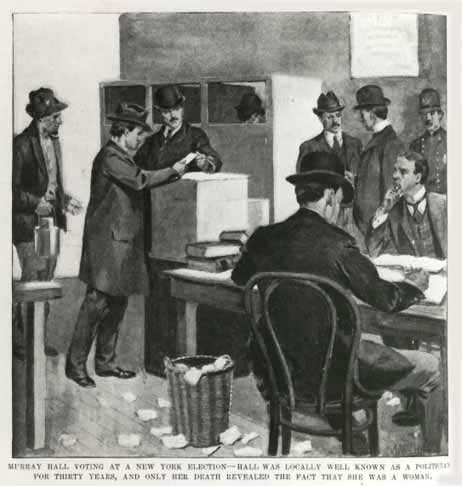

I was super confused throughout the whole Boudica story till this: “Sounds a little like ‘bulldyker,’ doesn’t it?” and I realized I’d been reading it wrong the whole time. I was thinking something along the lines of Bo-diss-a. Slap forehead. It’s been a long day.
This is always confused me when we were learning about her in school, there are a couple of very different ways of saying (and spelling) her name and no-one ever gave me a satisfactory explanation for why.
The different prononciation thing is pretty interesting! ‘Boadicea’ most likely derives from a Medieval mistranscription of the name used by Tacticus, a Roman historian. ‘Boudica’, which is now generally accepted as the ‘correct’ pronunciation, is an attempt to recreate what her name would have actually sounded like, drawn from a some pretty convincing research into the Old Celtic languages (iirc it’s from an adjective meaning ‘victorious’). I think there were some even weirder versions floating around in the 19th century!
Bow-dick-ah. I think. Cool beans, huh?
Ah bum, that should say TACITUS. Too much Pratchett on the brain!
Yay, Pratchett fan!
REALLY COOL BEANS. Thank you Eifa!
Oh my gosh…. and I thought I was obsessed with the story of Boudica BEFORE I read this article!
I think this is my favourite more than words article! Very interesting..
Speaking about reclaiming the word dyke, has anyone noticed an increase in straight people using this word to refer to lesbians in a nonchalant way? I know that’s sort of expected when reclaiming words, but it just makes me feel uncomfortable.
I’ve always heard it as a pejorative when used by straight people, except when quoting something that uses the term dyke. But I agree with you, anyone using it who isn’t identifying as a dyke makes me uncomfortable.
I’m so very pleased that adorable little duiker has some roots in all this.
This got me thinking of my love for warrior women and I claim Athena as Goddess of the lesbians*. She was seriously bad ass, and not just the Goddess of wisdom as she’s often reduced to in western culture, but also just warfare and defense and a bunch of other things. She put a beatdown on Ares once!
I really love looking at ancient statuary of her, there’s is an impressive consensus between sculptors over the years about what she looked like, and I’ve always gotten a strong queer vibe off of them. And as we all know, she didn’t need no man.
*Artemis is a pretty good choice too though, but Athena is just more awesome to me.
According to the original Demeter/Persephone myth, Athena was raised with Artemis and Persephone on an island in perpetual springtime where they frolicked with nymphs (who were the emodiment of that scary female sexuality) all day and all three goddesses begged Zeus never to make them marry men. They also tended to spear men who tried to spy on them. Also there’s a line about Persephone dancing in circles while “on this side stepping close by Athena, on that side hand in hand with her beloved Artemis…” So in other words… Gaaaayyyyy.
(Obviously I have a lot of mythology feels.)
If we had learned that Greek myth during 10th grade English I might have actually stayed awake!
A lot of schools teach a watered down version of the Persephone myth, but the originals are so much cooler and classes tend to leave out some of the best parts, like the basically lesbian witch goddess Hekate (who is widely believed to be another form for Artemis) descending into the underworld with Demeter to find Persephone and the fact that the Persephone myth is actually a myth stolen and repurposed by the Greeks. (It’s a myth common of pre-Greece matriarchal societies that would often involve a spring goddess becoming ruler of the underworld, symbolizing death as a returning to the earth instead of a violent tragedy. It’s also why it’s the only greek myth featuring a loving mother/daughter bond that doesn’t end brutal death.)
The more you know!
Would you be so kind as to give me a link to this stuff?
Also: Would that be the same Hecate as the one in MacBeth?
Sure!
Here’s a decent translation of the Persephone myth (technically it’s the Demeter myth, since there’s no official story telling things from Persephone’s POV): http://www.uh.edu/~cldue/texts/demeter.html
And a few links about different people (this site in general rocks socks because it culls from many reputable places and almost always sites their sources.):
Persephone: http://www.theoi.com/Khthonios/Persephone.html
Hekate: http://www.theoi.com/Khthonios/Hekate.html
Pallas [Athena]: http://www.theoi.com/Olympios/Athena.html
Artemis: http://www.theoi.com/Olympios/Artemis.html
And yep, meant to be the same witch! Hekate (or Hecate) was thought in Greek mythology to be the first witch, so Shakespeare used her (as did Buffy, LOL!) However, the Hecate in MacBeth isn’t much like the Hekate of myth.
Hope that helps!
This is fascinating stuff! I’ve loved reading about ancient mythologies in general, but Greek ones in particular since I was a child. I also love reading Homer who I got to in a roundabout way from being a huge Shakespeare fan. lol
Thank you so much!
O.o
Excuse me while I go and reread all the myths…and I thought these were awesome stories before.
I made Athena and Artemis a pairing in my webseries.
What series is that? Link please! :)
Thalia’s Musings. The lesbian romance is mostly in Volume 2, but if you like irreverent retellings of classic mythology, you’ll probably enjoy the whole series. This prequel short story has Persephone plotting her very consensual “abduction” with Hades, and some Artemis/Athena stuff.
Definitely second this. Because Athena is the fucking best.
Also apparently drunk me prays to Athena, so.
I don’t think “Dyke” is that old. I think it originated in Harlem in the 1920s. See http://en.wikipedia.org/wiki/Gladys_Bentley
The Boudica myth is just cuter. And whiter.
Also, I think the lede was a bit buried here. The pdf you cited: http://williamapercy.com/wiki/images/In_America_They_Call_us_Dykes.pdf goes into the origins of bulldyke in African American culture.
Yeah, there does seem to be a consensus about the trajectory of the word post-1920 or so. But there’s still argument about the roots, which is what this post was meant to address. Harlem will be all over Part 2 for sure.
The Boudica hypothesis is one I read about 20 years ago when I was a teenager. And while it makes for a great narrative, it does not make any kind of sense. I get the desire to try and tie lesbian history to less oppressed roots like greek goddesses and lilly white warrior queens. But it doesn’t make etymological sense. Dyke has long been the pejorative of choice for female queers among the poor, working-class and non-academics. And it also happens that blue-collar female queers were the first to embrace being dyke identified.
The only people arguing that maybe dyke came from some place more “sophisticated” than Harlem are white college educated lesbians. I don’t think it’s an intentional white-washing so to speak, but perhaps just a desire to make Dyke more relatable to middle-class white queers. But honestly, it feels like appropriation….and I’m white.
I have a lot of feelings about it, and it’s a long story that involves a lot of Bessie Smith music.
“I was a little disappointed to find that dyke in the ‘gay-woman’ sense has nothing to do with dyke in the ‘stick-your-finger-in-it-all-night-to-save-a-country’ sense.”
I’m so confused…how are these contrasting ideas? I thought fingerblasting was the most patriotic thing a person could do (‘cuz it sure seems that way some nights…)
Yes indeed.
Also this:
http://nodamncatnodamncradle.tumblr.com/post/5678993270/pusssypower-an-art-piece-that-reads-eating
Dig your column. Classicist got a small errorthough–pointing them out in good faith as one nitpicky academic-type to another. The Suetonius who defeated Boudica wasn’t an emperor, just a governor. The emperor at the time was Nero.
Maybe I should assert my queer identity as Boudiccan….haha.
Hey thanks! Good catch.
“People might have started using her name to refer to any woman who seemed like she could potentially lead an army of thousands.”
Yeah, that sounds about right :)
The thing about claiming that ‘dyke’ comes from Ancient Greek is that present day Greek (speaking) queer women don’t get called ‘dyke’. Surely, if it originated in Greek it would make sense for it to still be used among Greek speaking communities just as much or more frequently than it’s used in communities on another continent speaking a language that only has very loose linguistic ties with Greek?
But you’re assuming cultural and linguistic continuity simply because of geography. What a culture did or said 2000+ years ago has no bearing on what people will do or say in that same area now.
As someone who was in school but had to drop out, I really love getting these super cool and informative articles sprinkled in my AS experience. I especially love learning even more from reading the comments and following the links everyone posts.
Well now I’m confused about which is my dream school- warrior school or Hogwarts
There’s also the Dik-Dik, similar to the Duiker but smaller (around the size of a hare.) Maybe it’s the baby dyke of the animal kingdom. (But seriously, google it- they’re adorable.)
i look at the shields at the bottom of the picture of queen boudica and all i see is boobs.
sorry.
all i ever see is boobs